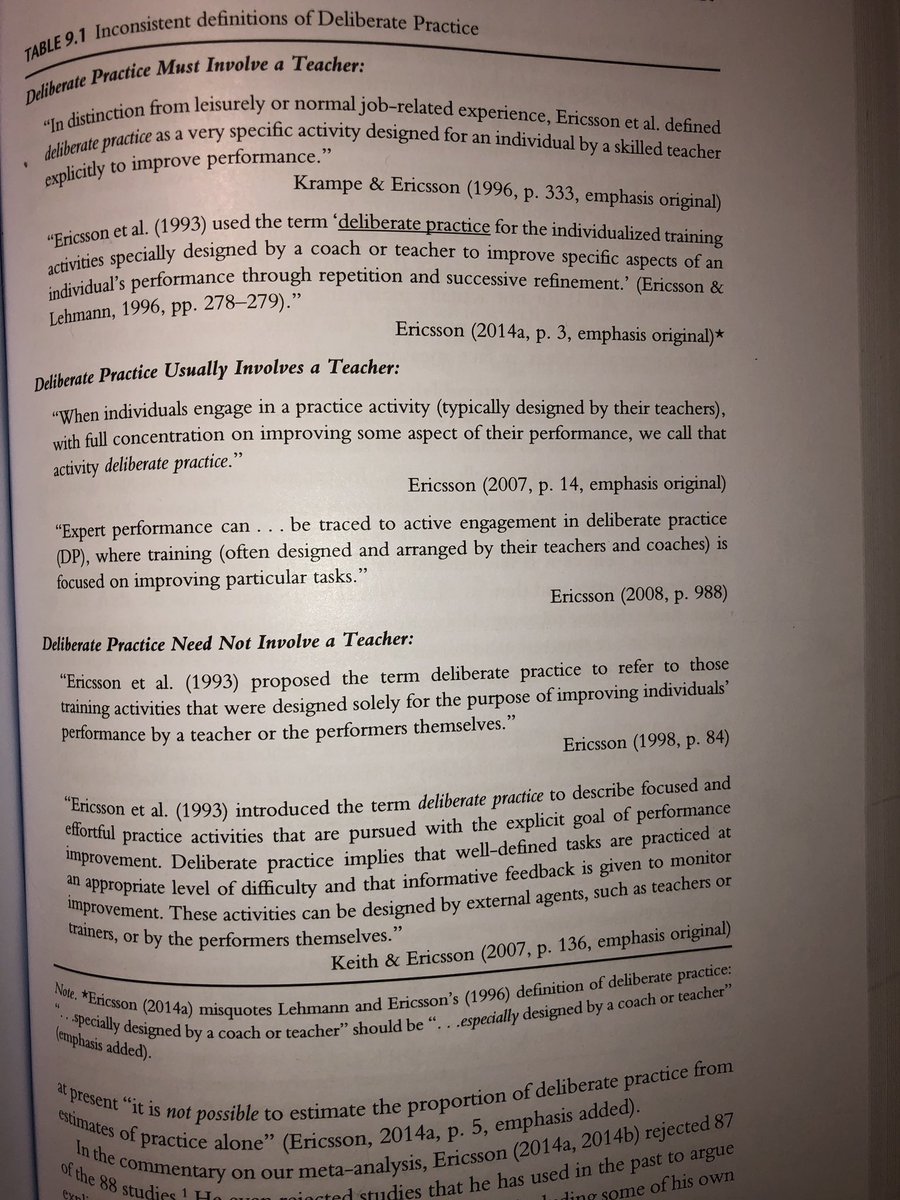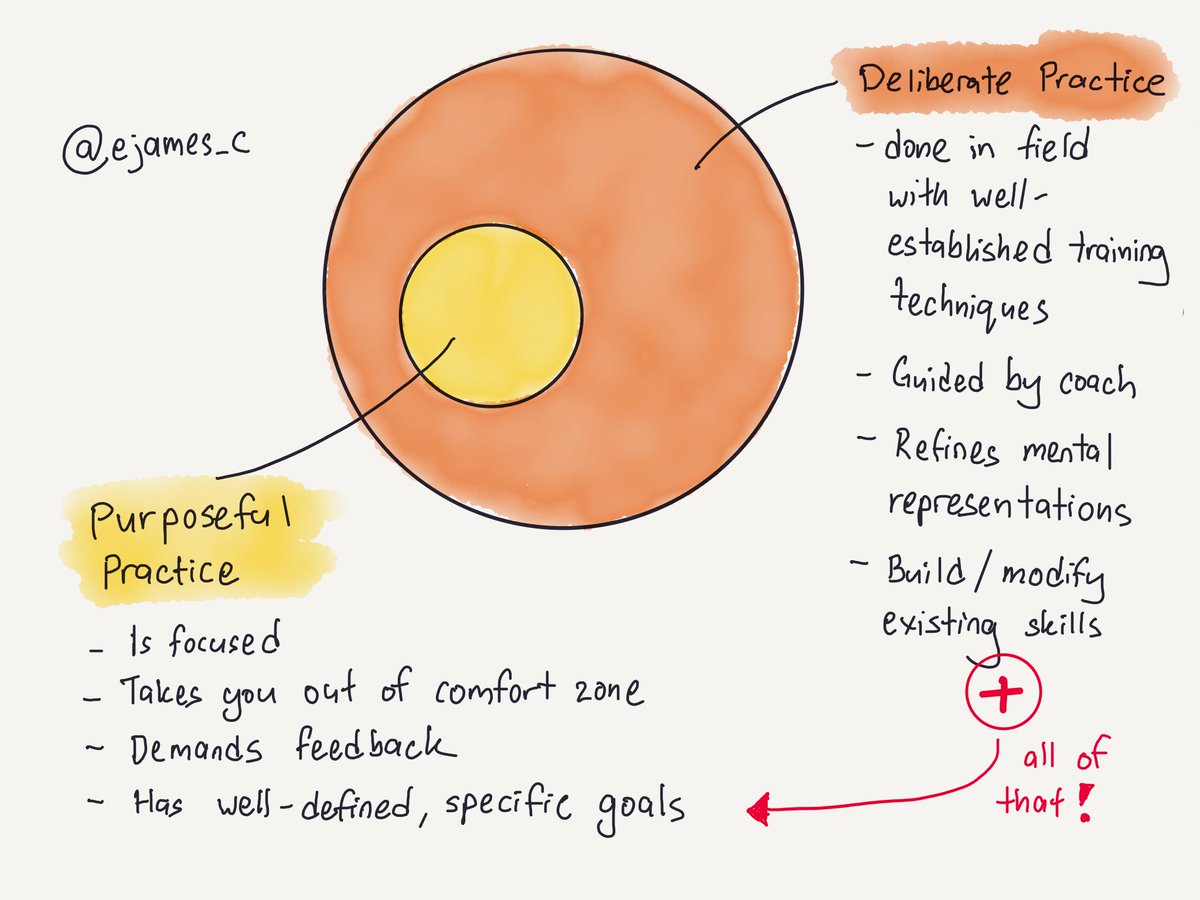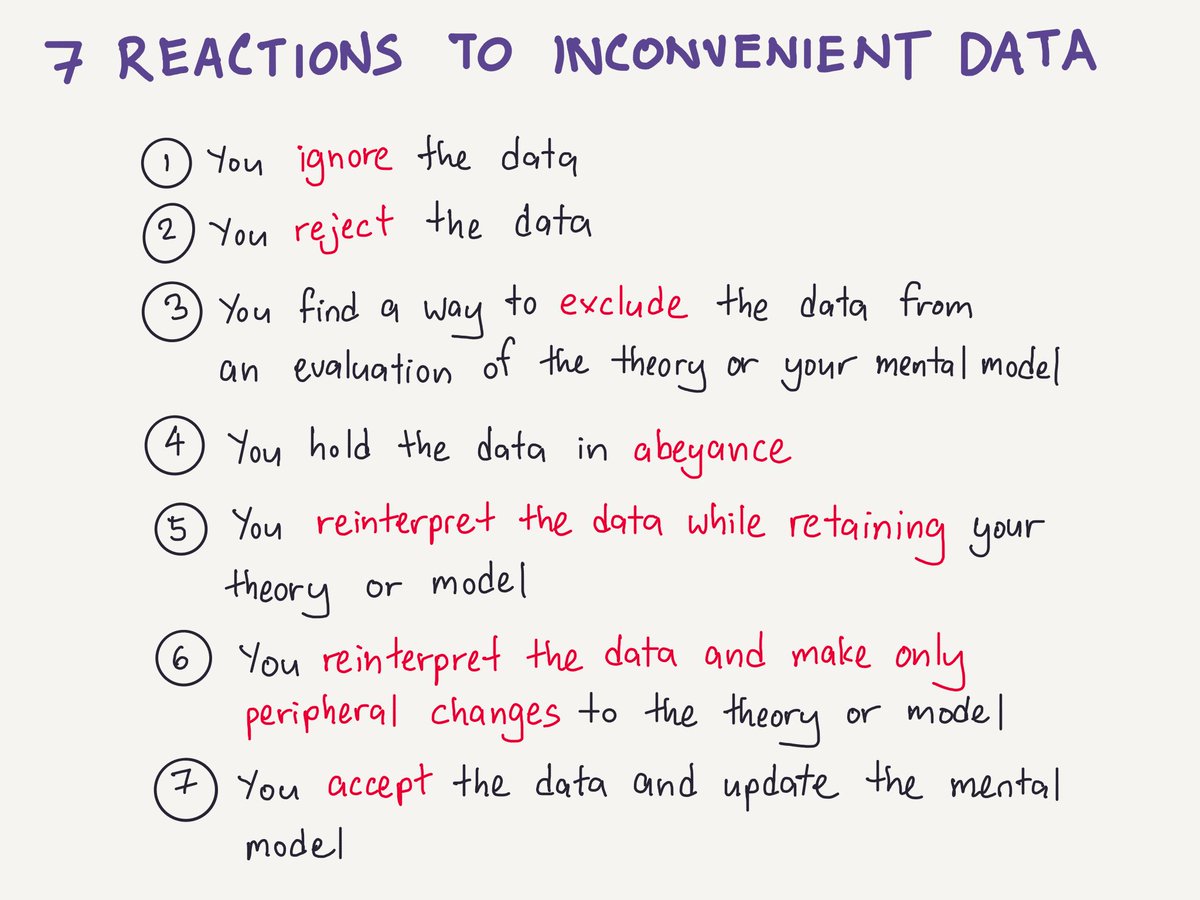
1/ One of my most persistent irritations is with the whole 'OH YOU NEED TO DO DELIBERATE PRACTICE' meme.
Ugh, no, perhaps you don't. It depends on your domain. Deliberate practice has problems. Have you even tried?
I've written about this before, but here's a thread.
Ugh, no, perhaps you don't. It depends on your domain. Deliberate practice has problems. Have you even tried?
I've written about this before, but here's a thread.
2/ First: DP is a real theory, and it's one of the greatest contributions to our understanding of expertise.
It is a technical term. It does NOT mean 'practicing deliberately'. We'll define it soon.
My problems with it stem mostly from trying to apply it, and failing miserably.
It is a technical term. It does NOT mean 'practicing deliberately'. We'll define it soon.
My problems with it stem mostly from trying to apply it, and failing miserably.
3/ Ok, let's define DP. To make things a little complicated, DP is tricky to define because K Anders Ericsson has been inconsistent with definitions throughout his career (see pic, from The Science of Expertise, Hambrick et al). 

4/ I'm going to use the definition Ericsson set out in Peak. In Peak, DP is:
- Done in a field with well-established training techniques.
- Guided in initial stages by a coach.
- Depends on refining mental representations.
- Involved building/modifying previously learnt skills.
- Done in a field with well-established training techniques.
- Guided in initial stages by a coach.
- Depends on refining mental representations.
- Involved building/modifying previously learnt skills.

5/ On top of that, DP also contains the following properties, which Ericsson describes as 'purposeful practice':
- is focused
- takes you out of your comfort zone
- requires feedback as part of practice
- has well-defined, specific goals.
- is focused
- takes you out of your comfort zone
- requires feedback as part of practice
- has well-defined, specific goals.
6/ Note that again, deliberate practice is a SUPERSET of purposeful practice. DP is everything in purposeful practice and then some.
Ericsson is careful to say that purposeful practice ALONE is not as good. See illustration:
Ericsson is careful to say that purposeful practice ALONE is not as good. See illustration:

7/ So, ok. DP is the best form of practice possible, and it requires all those things. So what?
Well, let's say you become a manager. Management is a skill. There are good managers and bad managers.
Let's say that you want to do deliberate practice for management.
Well, let's say you become a manager. Management is a skill. There are good managers and bad managers.
Let's say that you want to do deliberate practice for management.
8/ My question to you:
Where are the widely-established management training techniques?
What is the pedagogy?
Who are your coaches?
How do you get good timely feedback?
How do you focus?
Oh, you can't answer these questions? Then you can't do DP. Let's try another one.
Where are the widely-established management training techniques?
What is the pedagogy?
Who are your coaches?
How do you get good timely feedback?
How do you focus?
Oh, you can't answer these questions? Then you can't do DP. Let's try another one.
9/ You want to get good at investing.
Where are the well-established investment training techniques?
Who has done pedagogical development?
Coaches?
How do you get good feedback?
What are your well-defined, specific goals?
You don't have good answers? No DP for you.
Where are the well-established investment training techniques?
Who has done pedagogical development?
Coaches?
How do you get good feedback?
What are your well-defined, specific goals?
You don't have good answers? No DP for you.
10/ Try asking these questions for many of the skills you might want to get good at in your career:
- Getting good at organisational politics.
- Negotiating deals for your company.
- Developing code 'taste' when building large software systems.
- Inventing new marketing methods.
- Getting good at organisational politics.
- Negotiating deals for your company.
- Developing code 'taste' when building large software systems.
- Inventing new marketing methods.
11/ How do you get good at all of these things? Not by DP, for sure.
In fact, even WITHIN the domain of music, researchers admit that good pop musicians and jazz folk do not do DP to get good! Only classical musicians do so.
In fact, even WITHIN the domain of music, researchers admit that good pop musicians and jazz folk do not do DP to get good! Only classical musicians do so.
12/ In Peak, Ericsson sort of does a cop-out and says "ok, so maybe you can't do DP in your domain, but you can use the PRINCIPLES of DP!"
Sure. But DP assumes good, clean feedback, and many real world skills don't have that. Leadership, say. Or portfolio construction.
Sure. But DP assumes good, clean feedback, and many real world skills don't have that. Leadership, say. Or portfolio construction.
13/ And so this is the dirty little secret of the deliberate practice literature. It was built on top of bounded skill domains with already well-established training methods. Things like chess, and music, and tennis and math!
14/ Implication: if you are in a messy skill domain with no well-established training methods — like MOST OF THE SKILL DOMAINS IN YOUR CAREER — you can't do DP.
15/ Now, there is an interesting catch. It's totally possible for a skill domain to experience pedagogical development — that is, for coaches and practitioners to discover, establish and share a body of tested training methods.
Suddenly DP becomes possible for that domain.
Suddenly DP becomes possible for that domain.
16/ But this is really hard. And the skills required for pedagogical development are different from the skills required to get good at the domain.
It's likely you don't have time for that, especially if you just want to get good at your career.
It's likely you don't have time for that, especially if you just want to get good at your career.
17/ So what do you do? Well, you look for alternative training methods.
Like a learning theory that teaches you how to learn better from your experiences:
Like a learning theory that teaches you how to learn better from your experiences:
https://twitter.com/ejames_c/status/1425748877987229696?s=20
18/ Or a body of work that allows you to extract tacit mental models of expertise from the heads of experts around you: commoncog.com/blog/how-to-le…
19/ None of this is new, and anyone who's followed my writing/experimentations with DP would be familiar with the arguments here.
The next time you find someone recommending Deliberate Practice, ask them what domain they're speaking of, and what they know of the practice.
The next time you find someone recommending Deliberate Practice, ask them what domain they're speaking of, and what they know of the practice.
20/ It's likely they haven't actually tried using it. If they did, they would know how difficult it is to do. And they would have come to grips with the core limitations of the theory itself.
The end.
The end.
21/ Follow if you'd like more threads like this. I mostly write about expertise in the context of making better business and career decisions. But in a 'let's actually try to put this to practice' sense.
Also, my newsletter: commoncog.com/blog/subscribe…
Thank you for reading!
Also, my newsletter: commoncog.com/blog/subscribe…
Thank you for reading!
• • •
Missing some Tweet in this thread? You can try to
force a refresh






